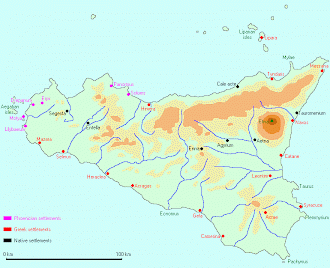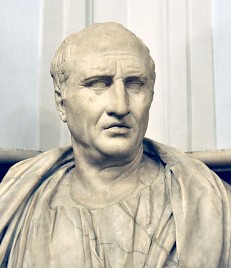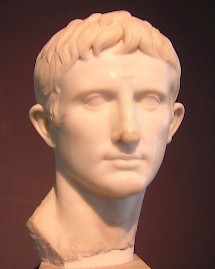Sicily (7)
Q691321Sicily: large and rich island opposite the Italian mainland. In Antiquity, it was settled by Phoenicians and Greeks, and contested by the Carthaginians, Romans, Ostrogoths, and Byzantines.
Roman Province

After the First Punic War, all of Sicily was part of the Roman empire, and in c.200, any intelligent observer would have been able to see that Rome, with its aggressive mentality and limitless resources of manpower, would one day unite the entire Mediterranean. Indeed, Sicily remained Roman until the Ostrogoths conquered Italy in the early sixth century.
Roman provinces had to pay taxes. As always, the Romans divided the conquered towns (divide et impera, "divide and rule"). There were four classes of cities, defined by there status as tax payers:
- Allied cities (Messana, Tauromenium, Netum), which had to send soldiers when requested, but paid no taxes;
- Free cities (five, a/o Palermo), which were not really independent but could pretend to be so;
- Tributary cities under the old Lex Hieronica (thirty-four);
- and twenty-six cities under Roman tributary laws.
Because people are more willing to pay taxes when they have a feeling that the government is interested in their well-being, the Roman governor was also responsible for public peace and served as supreme judge. Yet, from an economic point of view, the island was just exploited by the two quaestores (one in Lilybaeum, one in Syracuse). Sicily paid more money than the Roman government spent. Unfortunately, we don't know very much about this period, because our sources are scarce (the relevant parts of the World History of Diodorus of Sicily are lost) and after 132, there were considerable changes in the system of government.
Another development was the introduction of large plantations (latifundia). They were owned by rich Romans and produced grain that was exported to Rome. The work was done by large numbers of slaves - often prisoners of war belonging to the same ethnic group: e.g., Celtiberians, Syrians, or Thracians. They were permitted to venerate their own gods and could speak their native language, so they were able to organize resistance against their owners without the Romans being aware. In 136 or 135, a man named Eunus was able to provoke an insurrection and seized the city of Henna in central Sicily. The praetor was defeated, Agrigentum, Tauromenium and Catana were captured, and Eunus was recognized as king.
However, the Romans were able to overcome the revolt. Eunus was brought to Rome and died in jail. His legacy was simple: he had shown that slaves could be successful. In 104-101, Salvius Trypho and Athenio revolted on Sicily, and in 73-71, Italy was in great turmoil because of the insurrection led by the famous slave leader Spartacus.

At the same time, the governor of Sicily was a man named Verres. He had exploited the province even more ruthlessly than any governor before but had made the mistake to include a client of the powerful general Pompey among his victims. In the early summer of 70, the Sicilians asked help from a relatively unknown lawyer, Marcus Tullius Cicero. Verres, supported by the powerful clan of the Metellii, hired the best advocate of his age, Hortensius, and a legal duel started. In 70, Pompey was consul (together with Crassus), and Hortensius tried to postpone the case to 69. However, Cicero was able to gather lots of evidence in only a couple of weeks. After his first thundering speech, Hortensius abandoned his brief, Verres went into exile, and no Roman senator was able to ignore that some reform in the provinces was necessary.
The Senate was divided on the nature of these reforms. Among the radical reformers was Julius Caesar, who, as consul, renewed the tax-laws in 59, demanding a fixed tribute. However, there was much obstruction and Caesar's increasing power after his wars in Gaul created resentment. Civil war broke out between Pompey and Caesar, and, after the death of Caesar, his adherents (Mark Antony, Lepidus, Octavian - the Second Triumvirate) successfully waged war against his murderers (Brutus and Cassius). Because Sicily was of some strategic value - Rome needed Sicilian grain - the Caesarians gave the Sicilians full Roman rights, just to be sure that they remained loyal. This was a remarkable act, because most Sicilians spoke Greek and did not think of themselves as Italians or Romans. Yet, the priviliges were there.
But the days of Greek Sicily were over. During the conflict between the triumvirs and Caesar's murderers, a son of Pompey, Sextus Pompeius, seized power in Sicily and started to gather senators who wanted to overthrow the military leaders. The island became a pirate's nest, and Sextus Pompeius pretended he was protected by the sea god Neptune. However, Octavian, his admiral Marcus Vipsanius Agrippa, and Lepidus defeated Sextus Pompeius, and Octavian immediately stripped Lepidus of his powers (in 36). The island suffered terribly. Messana was sacked and large tracts of land were confiscated by Octavian.

Once again, Sicily had played an important role in Mediterranean history. From now on, it was obvious that Octavian would become sole ruler of the Roman world. He had defeated Caesar's murderers, had defeated the last senators, had defeated Lepidus. Only Mark Antony was still there, and he was defeated in 31 at Actium. Octavian, now sole ruler and calling himself Augustus, reorganized the empire, which meant that the government of the provinces was improved. From now on, Sicily was a senatorial province without legions, and the governor was a proconsul with praetorian powers. Several Sicilian cities received the rank of colonia.
Now, Sicily started to change. Until then, it had been part of the Greek world, but now people started to speak Latin. Official inscriptions were increasingly written in that language, it was used on coins, and people wanted to be buried in tombs with Latin epitaphs. The island still sold grain to Rome, and could also export wool, timber, and wine. The money was invested in new buildings, and many monuments now to be seen date back to the Roman period. At the same time, the towns in the interior of Sicily were converted into large villas, occupied by senators, whose presence was no longer needed in imperial Rome. Southern Sicily was in decline,note and other parts of the island became imperial estates and domains. A procurator took care of them.
The Roman empire had come to rest after the civil wars; it had become a monarchy. Sicily had lost its independence and became formally a part of Italy. Its history also became part of Italian history. Important decisions were no longer taken in its cities, and the island more or less disappears from our sources.